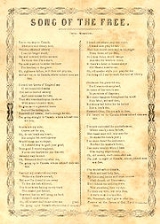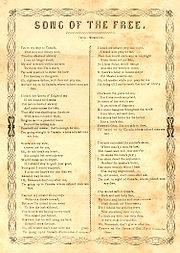
Song of the Free
Encyclopedia
Song of the Free is a song written in 1860 about a man fleeing slavery
in Tennessee
by escaping to Canada
via the Underground Railroad
. It is composed to the tune of Oh! Susanna
.
 The song alludes to, and explicitly states, the lack of freedom experienced by African American
The song alludes to, and explicitly states, the lack of freedom experienced by African American
s, and of their servitude to masters who controlled them. It highlights the dangers they were willing to face in order to escape enslavement, including death. Every stanza ends with a reference to Canada as the land "where colored men are free". Although there had been slavery in Canada
, an 1803 ruling by Chief Justice William Osgoode
had set free many slaves, and the practice was completely abolished in 1834 with the passing of the Slavery Abolition Act
in the British Parliament
, which at the time still governed Upper
and Lower Canada
. This led to the development of the Underground Railroad.
The song's first stanza:
I'm on my way to Canada,
That cold and dreary land,
The dire effects of slavery
I can no longer stand,
My soul is vexed within me more
To think that I'm a slave,
I'm now resolved to strike the blow
For freedom, or the grave.
Oh, righteous father, wilt thou not pity me,
And aid me on to Canada, where colored men are free.
Slavery
Slavery is a system under which people are treated as property to be bought and sold, and are forced to work. Slaves can be held against their will from the time of their capture, purchase or birth, and deprived of the right to leave, to refuse to work, or to demand compensation...
in Tennessee
Tennessee
Tennessee is a U.S. state located in the Southeastern United States. It has a population of 6,346,105, making it the nation's 17th-largest state by population, and covers , making it the 36th-largest by total land area...
by escaping to Canada
Canada
Canada is a North American country consisting of ten provinces and three territories. Located in the northern part of the continent, it extends from the Atlantic Ocean in the east to the Pacific Ocean in the west, and northward into the Arctic Ocean...
via the Underground Railroad
Underground Railroad
The Underground Railroad was an informal network of secret routes and safe houses used by 19th-century black slaves in the United States to escape to free states and Canada with the aid of abolitionists and allies who were sympathetic to their cause. The term is also applied to the abolitionists,...
. It is composed to the tune of Oh! Susanna
Oh! Susanna
"Oh! Susanna" is a minstrel song by Stephen Foster . It was published by W. C. Peters & Co. in Cincinnati, Ohio in 1848. The song was introduced by a local quintette at a concert in Andrews' Eagle Ice Cream Saloon in Pittsburgh, Pennsylvania on September 11, 1847. Foster was said to have written...
.
Lyrics

African American
African Americans are citizens or residents of the United States who have at least partial ancestry from any of the native populations of Sub-Saharan Africa and are the direct descendants of enslaved Africans within the boundaries of the present United States...
s, and of their servitude to masters who controlled them. It highlights the dangers they were willing to face in order to escape enslavement, including death. Every stanza ends with a reference to Canada as the land "where colored men are free". Although there had been slavery in Canada
Slavery in Canada
Slavery in what now comprises Canada existed into the 1830s, when slavery was officially abolished. Some slaves were of African descent, while others were aboriginal . Slavery which was practiced within Canada's current geography, was practiced primarily by Aboriginal groups...
, an 1803 ruling by Chief Justice William Osgoode
William Osgoode
William Osgoode was the first Chief Justice of Ontario, Canada.He was born William Osgood in London, England in 1754 to William Osgood. He attended Christ Church, Oxford and was called to the bar in 1779. On December 31, 1791, he was appointed first Chief Justice of Upper Canada...
had set free many slaves, and the practice was completely abolished in 1834 with the passing of the Slavery Abolition Act
Slavery Abolition Act
The Slavery Abolition Act 1833 was an 1833 Act of the Parliament of the United Kingdom abolishing slavery throughout the British Empire...
in the British Parliament
Parliament of the United Kingdom
The Parliament of the United Kingdom of Great Britain and Northern Ireland is the supreme legislative body in the United Kingdom, British Crown dependencies and British overseas territories, located in London...
, which at the time still governed Upper
Upper Canada
The Province of Upper Canada was a political division in British Canada established in 1791 by the British Empire to govern the central third of the lands in British North America and to accommodate Loyalist refugees from the United States of America after the American Revolution...
and Lower Canada
Lower Canada
The Province of Lower Canada was a British colony on the lower Saint Lawrence River and the shores of the Gulf of Saint Lawrence...
. This led to the development of the Underground Railroad.
The song's first stanza:
I'm on my way to Canada,
That cold and dreary land,
The dire effects of slavery
I can no longer stand,
My soul is vexed within me more
To think that I'm a slave,
I'm now resolved to strike the blow
For freedom, or the grave.
Oh, righteous father, wilt thou not pity me,
And aid me on to Canada, where colored men are free.

